Download a copy of this article as a PDF for your Ipad or Kindle! (right click and “save as”)
Facebook lost 5-6 Million members in the US in May 2011, mention of $100 Billion IPO comes same day.
Facebook Today
Facebook – what was a fun little site, the entire business world has turned into the Holy Grail. This is troubling, because it’s not the site that is amazing, but the new social comm technology that connects people. I crunch some numbers here, and it’s obvious people aren’t interacting with brands on Facebook. Why are we losing sight of this? It’s just a platform, and membership does not attest to equity. Equity is where the internet is happening, and the internet is not happening on Facebook.
Facebook might have a $100 Billion IPO, for Q1 2012. Why would they let this ridiculous evaluation slip the same day it is announced that they also lost 6 Million people in May, via WebProNews. Gizmodo says 5 Million. A Facebook insider says “nearly 6 million”.
It seems interesting, especially because one would hope that a whopping $100 billion would drown out the measly figure of 5-6 million members. It’s notoriously difficult to cancel an account, so what’s going on? Was the drop a culling of the notorious spam that poisons social media? Is it businesses finally deleting their profile they built before the advent of pages? I know of a couple that have done so in the recent weeks. It’s a bigger, more frightening, trend than this.
Read More……
The Social Media World watches as Groupon readies an insane IPO
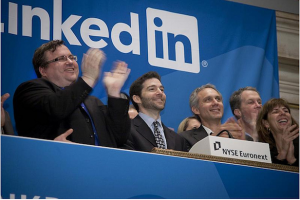
I want to have a quick aside, and remind you that we all know Groupon is insolvent. In fact, it’s safe to suggest that Facebook is aware that the social media darling is in crisis, having the market panic about feasibility as they approach an IPO. An important IPO – one that tests the waters in a much deeper way than LinkedIn, a relatively conservative and successful no brainer in this 2.0 world. It is also fair to acknowledge that whatever consumers do not know about Groupon, as Wall Street eyes Groupon’s likely failure as a business, other businesses are beginning to have a deep awareness of its flaws, which I documented here (with endless citation and evidence), but Techcrunch excellently explains it here. Businesses wariness to sign up, coupled with Groupon’s balance sheet, makes that look like another disaster, and this is only valued at $20 Billion, one-fifth of the murmured Facebook IPO. Do you think Facebook is watching Groupon’s “road-to-IPO” closely?
Facebook is failing, but it depends on how you want to define that. At User Interface? At listening to consumers? At facilitating connection, communication, discussion? Helping create a consumer environment for our businesses? This is something that is going to be defined by every individual angle – social media, individual people, business… but it’s safe to say they are failing everyone.
The Filter Bubble Problem
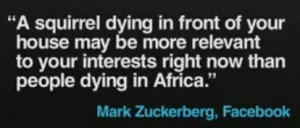
Facebook has made made it so you can hide everything you dislike about the site. You can hide people or pages, you can hide causes, games, specific api’s that post, specific phones, and more. These are the filters that Eli Pariser speaks about – the filter bubbles driving us apart, creating a homogenic environment, and limiting true connection and democratic discourse – and the resulting ethical issues involved. These filters are meant to be a response to Facebook users’ dissatisfaction of the interface and lack of proper privacy controls. Users tire of mindless advertising and spam; being inundated with extraneous applications or attempts at monetizing the user base are finally wearing thin. These filters are simply a way for you to shut down the site little by little, bit by bit. By developing these tools, Facebook has expressively admitted that the whole network is spam. I spoke about these hidden streams, overposting, and attention curation as equity, and you know that I do not consider Facebook a network in the traditional sense of the word. If I don’t know who has hidden my business, then I don’t know who my network is, and therefore it is essentially defunct.
Could you imagine the statistics on overall users or pages hidden? Have you ever hidden anything on Facebook? I think it is completely unstable as a network, and assume Facebook will at some point have to unhide everything to fix some of the problems of “community”. I had hoped I wouldn’t have to post about Facebook again, but it isn’t just about narcissism and the challenge of pages.
Monetization
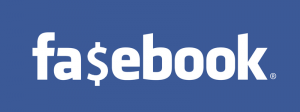
Facebook is constantly altering their UI & architecture, so as to generate constant cash flow. These attempts at creation of revenue wholly disregard the individual users’ privacy & bungles the process constantly. Beyond Zuckerberg’s slip ups, and horrid PR, Facebook adds confusing, unstable layers to a flawed structure/network that is based off of variably meaningful geo-connections. Social connections should *obviously* include *immediate* social circles, but the strongest online connections are based off interest, and do not necessarily involve family or educational institution, the latter which connects similar classmates across broad social, economic, and political backgrounds. Until Facebook figures this out, their dominance is tenuous. You cannot create a solid network based off of loose interests. Topics/Subject matter drive content creation, and content creation drives social networks.
Facebook’s slapdash and immature attempts at monetizing a site with enormous architectural flaws have made it a broken network, and now they are bleeding users…. there are so many meaningful, topical driven sites, that people simply don’t need it anymore. With the rise of topical boards, Facebook is moot. You can still check in on your grandkids, or your college ex-boyfriend’s family on Facebook, but most people seem to feel more comfortable generating content in like minded communities, which also includes Tumblr and Twitter. Tumblr has stolen an entire generation of younger kids, Twitter has mid 30’s parents and professionals who don’t have the time for the vacuousness of Facebook, or the time to figure it out. This is where Facebook’s content is being generated – elsewhere. Everyone still has a Facebook account, but you may be interested to know where the internet is really happening.
Where The Internet Happens

The internet happens in the open. It happens in an unregulated environment that business has little interaction with. Foodies have Chowhound or Eater to talk recipes, cuisine, and what’s hot. Sports fans have their dream team forums or ESPN boards & an entire industry of social sites. Movie fans engage in sites like IMDB, Netflix, and Rotten Tomatoes, all rabid posters writing shining reviews or debating camera angles. Entertainment blogs have members on sites like TMZ or Gawker, where posters gab ad naseuom about the plastic world of their interest. These people *might* share on Facebook, but often the people that you know in the real world aren’t interested in the same hobbies or activities. Techies on Techcrunch or Engadget have devoted commenters espousing their applicable fanboydom. Relevant social sites like Mashable or open forums like Yelp Talk cover a bevvy of topics and retain interest from users. Traditional national and local newspapers cover the entire gamut of local events and allow a wide spectrum of commentators with insane devotion (sometimes literally). This doesn’t cover the existence of any millions of hobby or enthusiast boards for everything from offroading (based off the specific make and model of your truck) to knitting clubs or book clubs on small blogs or local sites to large sites like Amazon or Ebay. Even boards like 4chan create content and relevance that makes other sites pale in comparison. All this is an indication that social media has blossomed in a way that makes Facebook completely irrelevant. The walled garden, with too many privacy holes in the fence, leaves a lot to be desired, and users are finally leaving Facebook for greener, rolling pastures. It’s an apt analogy.
For example, my business is travel and hospitality. My entire industry is suffering devastating groupthink – and every conference or social media mention is about Facebook, driving revenue, ROI. I wanted to mention them, but don’t want to damage the conference economy built around Facebook. I will just say that I know there are those of you out there nodding your head (ed note: thank you for the emails). Do you want to know how I can be so brazen about this, and why your company’s efforts on Facebook are misguided? It’s painful to admit, but the real internet and real consumer isn’t on Facebook, and never planned to be. As soon as they are on Facebook, they are a sister or a grandmother or a college chum. But when those same people leave the site – they are consumers on flyertalk, tripadvisor, yelp, and any other consumer site referencing the interest they have at that moment. Someone can be on Facebook loading vacation pics one moment, and that can have zero relevance to the fact they are a consumer searching reviews for a hotel on Tripadvisor, a moment later. The two are not related. “Consumers” do not exist on Facebook, because when people are on Facebook, they shed the role of consumer (or at least they think they do, which is all it takes). A friend told me to be patient, but he was speaking to me about being patient in the business realm, that the facebook user will eventually be “born” a consumer. Well, I am not so sure the users have that sort of patience, and looking at their fickle migration patterns of the past, coupled with their distrust of Facebook management, I don’t think my patience will have anything to do with it.
Our Groupthink and What Your Business Needs to Ask
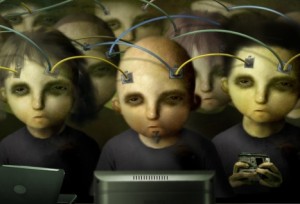
The groupthink throughout industry is to talk about how to leverage Facebook, and not whether it’s truly worth the effort or has intrinsic value. Everyone is so self interested that they won’t admit that it’s not the wonder it appears to be. The general rule is that you have to be where people commune, but it doesn’t mean it has to be anything more than a landing page. I went so far as to ask fans of some of our hotels what they thought of brands on Facebook. Informal test of 4 hotels was unanimous – everyone overposts, and it is tantamount to spam. The more you post, the more people hide you. Great… you got 5 comments!!! Then it’s likely, as 90% of people are lurkers, that even more hid you. You are losing attention every day with your Facebook pages.
Outside the US, along with Twitter, Facebook has been the only available tool with the reach to successfully organize people, and the result has been powerful and moving and undeniable.
But, inside the US, it has been co-opted by brands and marketing agents who attempt to exploit it and utilize it for business. This is all at the behest of Facebook, who is trying to monetize the hell out of the user base and define and reinforce the concept of “user equity”. Of course, businesses haven’t taken the time to realize there is almost no ROI, and when there is – it’s rare and far between. Why did they lose 6 million people in May? Is that real people, or is Facebook flushing out the coffers of spammers that are littering every corner of that network? Outside of this loss of users, how many existing accounts of the 700 Million members are spammers or multiple accounts? Dead accounts? How do they measure usage?
Define a successful campaign on Facebook? Define a successful business situation in regards to Facebook? Is it about money? brand building? interactivity? I have heard minor successes on Facebook, but no consistent, overwhelming victories as you may have heard from sites like Twitter. You know what would happen if any single hotel took their page off Facebook? Absolutely nothing. Facebook is a pass through. They interact with your brand on other sites like user generated review and rating sites, or topical boards where they can get advice from like minded people with expertise enough to answer tough questions. Uncle Harry or your high school prom date isn’t likely to be able to do that for you. People “like” and move on in Facebook, it’s a throwaway, passive activity; otherwise people don’t “like” anything because they don’t see the point, or don’t trust the process, even if they actually like something. It’s obvious there’s a flaw in this system as a trustworthy & equitable model for making business decisions. Facebook’s compulsion to legitimize the ad model structure of their social business has marginalized the ability for people to meaningfully connect. This erodes trust, and now people are finding other places to commune meaningfully online. People are still using Facebook in a personal manner, so they wear brands like fashion, for status. They aren’t interacting with the brand so much as showing it off as they might Gucci sunglasses or a Prada purse. There isn’t the compulsion or awareness by normal Facebook users to create commerce, or interact with businesses as they would on a review site, or topical network. The closed network based off random, extinct, geographical connections (school, etc) stifles ability to congregate and commune around brands or specific concepts. The groups and pages don’t work properly, because they were an afterthought to the original intent of Facebook.
Is what your organization puts into Facebook worth what is coming out of it?
The End of Facebook
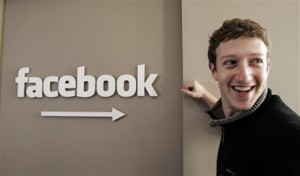
So far it’s been difficult to cultivate a social network into a successful long term business. You can’t build a social network, just ask Google. A small network goes viral, then that network spends years garnering users and destroying the site in the race to monetize it, until users move somewhere else. Facebook went viral overnight, but this doesn’t mean it’s a successful platform for business. Until they can offer a meaningful way to show real return or effeciveness, we are wasting labor and marketing dollars on a black hole. The reason they aren’t sharing any of their data regarding site usage is because they know it would hobble their $100 Billion IPO. The data and trends obvious in their private data, coupled with the social world’s IPO craze, it’s seems obvious they know the time is now, while they are jumping the shark. Their talk of IPO is nothing more than a cynical money grab. As Groupon will start the beginning of the 2.0 bubble, Facebook is desperate to cash in before it’s too late.
The sad part is that all these social media conferences and advertising or PR firms, coupled with the rest of big business, have so mindlessly invested endless money and time into developing their presence, they won’t be able to see the forest for the trees….. there is an entire economy that exists around Facebook, and people will have too much self interest to admit it’s time is passing. They will hold on dearly, for fear of having to make new presentation slides, or build yet another business profile on yet another network. Consultants will be frightened of being exposed for how much money they charge for administering Facebook. Operators won’t want to change a thing because they finally got the facebook action committee meeting in place, or the hierarchy of responsibility for posting and replies.
Many people are vested very deeply in Facebook’s success, and I fear that our inherent self interest will allow this IPO to happen without a hitch…. a massively inflated and dangerous number representing an inflated faux economy that could collapse harder than a previous bubble we all should know and remember. In fact, it’s going to happen. Groupon is the start of it. All that conversation about Groupon’s insolvancy and filed IPO papers – Facebook knows this. The collapse will bring greater scrutiny, deeper questions, and demand for much more reporting and numbers in regards to the site. As for now, Facebook stats are piece-meal, unsubstantiated guesswork, and Facebook is very secretive with all their usage stats. Once real data gets out, do you suppose that it will bolster the evaluation, or bring it back down to earth?
I think the answer is all too obvious. So Facebook is getting ready to cash in because they know they have peaked, and the other side of the mountain is a long way down. It’s a precarious time for our economy as well as my personal hospitality and travel world. Will we keep our heads down and keep espousing the genius of Facebook with empty stats and minor successes, or will we be big enough to move on, and realize that another time is passing? I doubt we will be big enough. But I hope this helps to create more of a dialogue that gets us there… ultimately one that protects the future of our economy.
Edit 16th June 2011:
A friend sent this article, “Older users likely to connect with businesses“. It is unfortunate that we are defining “connection” or interaction as something as passive as pressing a button. Users are tired of privacy issues, sure… but they are also tired of 90% of businesses doing Facebook wrong – not allowing user comments to appear on the wall, nor interacting and commenting on their posts. It’s an RSS feed, and that’s spam, and it’s being hidden, and you have lost their attention. When businesses realize the problems with Facebook, the lack of results, and the fact we burned most of bridges in trying to connect with users, ad sales will plummet, and the bottom will fall out. We are still in front of the Groupon IPO, and lessons can be learnt from the Pandora debacle from today. Show’s over, says VentureBeat, as Pandora skids hard. Stay vigil and stay aware, fight against groupthink, and engage your company with open-minded discussion regarding your next move.
UPDATE 30 Sept 2011:
Ed Note: Google Plus’ Open social graph will quickly make Facebook’s walled garden irrelevent. I quote Terrence Lui:
“Those of you reading this right now should realize something. You have a fantastic lead. Everybody who depends on Google to run their business, and there are a lot of them, and is ignoring Google+ right now is a fool. You are in on the ground floor of something that will fundamentally change what is now the foundation of the internet.
So take advantage of it while you can. Stake out your place on the high ground. At some point very soon, the crowd will wake up to the fact that Google is serious about all of this and the flood will come.”
But I think the most compelling and damning evidence is this: Twitter has seen more growth in the last 9 months than the past 5 years. It is vital to be aware of this fact. Since May, Facebook user base growth in the U.S. has completely stalled, while these other networks are growing faster than ever. I am basically done protecting my industry from the mindless groupthink. Let’s let those who are listening gain the high ground. Let’s let the vacuous & self interested, fall by the wayside. Good luck out there guys.
UPDATE 4th SEPTEMBER 2012
I thought I would post a few interesting updates to the debacle that is still unfolding. I never know whether to update an old post, or start a new one. Any advice is welcome.
The reams of information are beginning to flow, & people much smarter than myself are starting to peel apart what’s happened. As Forbes blames Zuckerberg, rightly, I think we need to be more realistic and put the blame firmly on the market, who chewed up hot air and went bonkers irrational, *again*. Business Insider mentions that NOBODY ACTUALLY READ THE PROSPECTUS OR ZUCK’S LETTER TO THE SHAREHOLDERS (lol). Of course, I assume most of the views that hit this post were due to readers searching for shelter amongst the hype. There were those of us well aware of the inflation, the over value, etc, so I saw a small and fiery group lobbing warnings and waving red flags. I think there were enough voices out there that many people were really saved from hurting their pocketbooks. At least I like to think so.
The real point of the update isn’t so much about the problems of the IPO. This post was about all that from June of 2011. But where are we now? Is that “Facebook will End on October 15th” joke going to come true? Can Facebook bounce back? Business Insider illustrates just how toxic the culture of Facebook has become, and the hue problems as a result of the IPO:
(they describe these issues at length in the above linked article):
Facebook’s stock crash has done more than blindside investors who figured that no price was too high for the IPO.
The crash has also created a bunch of new problems for the company:
- Lock-up releases will likely lead to hundreds of millions of new shares being dumped on the market over the next six months … and Facebook can no longer do a simple “follow-on offering” to manage this process.
- Facebook faces a massive ~$3 billion tax bill related to its employee stock compensation and can no longer do what it planned to do, which was sell shares to raise this cash.
- Facebook employees now have less incentive to stay at the company than they did prior to the IPO, which may make retention more difficult and expensive.


Fantastic and insightfully honest article on the future of Facebook, its effectiveness (or lack thereof) for businesses, and where it all goes from here…
That’s a brave blog post, certainly against what seems to be current consensus. While I agree with many of your arguments, namely the IPO bubble-like effect we are going through with Linkedin, Groupon and soon Facebook, I would not go as far as to say Facebook is declining.
You are right in that many hotels could probably remove themselves from Facebook with little effect, but there are some companies out there who connect very well on this platform. The key here is that we should not see FB as a holy grail, like you mention, but just another tool in the kit. Facebook is to this decade what internet was to the previous one, what TV was before that, and so on: a disruptive agent of change.
Ultimately, we need to remember what our brand strategies are, goals and objectives. Facebook, like twitter, internet and traditional media should all be considered accordingly, with resources allocated accordingly as well. Group-think is indeed lurking in the shadow, we just need to back to business basics…
Cheers,
I’ve not seriously used Facebook for about a year, other than to facilitate signups for services that I don’t end up using.
Software companies are different than bricks-and-mortar in that they have to find ways to obsolete themselves. eBay failed to do this and that’s why they are an afterthought. Amazon is obsoleting its online store business by building a massive API business that enables countless stores to perform e-commerce.
We use the software that fits the zeitgeist: what we like, what delivers intrinsic rewards, what is new and exciting enough to return to, again and again. Software has become as fast-moving as women’s fashion or television programming.
Once upon a time everyone used to watch “I Love Lucy” — and given its domination of TV for so long, no one could imagine life without Lucy or Ricky in some incarnation or another. Well, right now most people can’t imagine life without Facebook either — but that’s okay, because we once couldn’t imagine life without MySpace either, and we’re still doing quite OK, thank you.
I blogged about this back in 2005 in greater detail:
http://connectme.typepad.com/news/2005/02/lloyd_braun_on_.html
Great post Hraba… and spot on.
My online booking engine partner offered up a web booking module for my facebook page a few weeks ago. I asked them, “Why would I want to put a booking module on my facebook page?”. The answer wasn’t much better than “Because now you can, and that’s where your customers are.”. I politely declined the sales pitch, and let them know that some of my customers might in fact be there, but they aren’t looking to book a room at my Lodge while they are there.
Oh, and remember that social network… what was it called… MySpace. It was the most popular social networking site in 2006. That was only 5 years ago. It’s now off the radar. People are fickle with short term memories. Facebook is already proving it isn’t a long term platform. (Oh, and they don’t even have a good iPad app yet — really?!?)
So my take – as far as facebook is concerned – be there to hang out at the party while it lasts, but don’t spend any money to furnish one of the bedrooms. Just have some fun conversation in the kitchen, with your path to the door clearly in sight so you can make a quick exit before nights end.
I didn’t know that about the ipad. That’s sort of surreal. I know from a biz perspective, the way to officiantly and properly use the “new” Facebook.. tagging other hotels and biz and people…. no one will ever use it this way, and even when I do it rarely works. I hear you loud and clear: participate, be available, but don’t spend another dime. I am so glad this has resonated even slightly. =)
Superb analogy. Everything has it’s time. So do we. =) I can’t wait to read that post… always ahead of the curve, sir. =)
A thoughtful and thought-provoking post, Michael. Facebook has changed how many people interact online because it offers something that didn’t exist before: a search engine of the people for the people. It is wildly successful because so many people use it.
But it has been way over-hyped as a business tool, so it’s no surprise expectations haven’t been met. It’s simply another marketing channel, and an inefficient one at that. Its value lies in the ability to connect directly with consumers, and as a platform for consumers to share brand experiences. That alone merits a business page, but doesn’t justify all the time and effort some businesses are putting into it.
It’s not an effective sales channel. People go to Facebook to socialize; they go to sites like Amazon and TripAdvisor to shop. It’s an inefficient customer service tool and its use as a search tool is extremely limited. Many users deem the participation of businesses unwelcome, others a nuisance. But it wouldn’t exist if it didn’t make money somehow.
People will inevitably get tired of Facebook and move on to something new, but if it goes the way of MySpace a big reason will be because marketers ruined it by constantly badgering users, by interfering with their primary purpose for using Facebook: to connect with other people.
Thanks for the insightful post.
Twitter is learning to obsolete itself, look at its Apple iOS venture. It just seems more humble and willing to find new ways to add value.
It’s just funny to think about you at CU. I worked at a place called “Class Quotes” up on the Hill a little bit before your time. Perhaps some entrepreneuring student will come up with “Class Tweets” where paid note-takers go to classes and tweet the professors’ comments as a paid service.
Here’s a new Economsit article about all this…. “WELCOME TO IPOVILLE – Social media firms see champagne, others see bubbles”
a sidebar:
*NO* *WAY*. Class Quotes? I was going to work for them…. it’s where a proxy would audit and sell the notes to the skiers and drunkards, eh? Ha. Great memories.
I just see a red giant collapsing and the black hole is going to be ugly. So Imma gona talk about it.
haha…. that sounded like me. Great comment.
Interesting, thanks! I laughed when I saw a “share on Facebook” button at the end of your article.
Well played. Touche! =) I guarantee no one has shared any of my stuff on facebook. Ha. That might be my fault. Thanks for the comment!